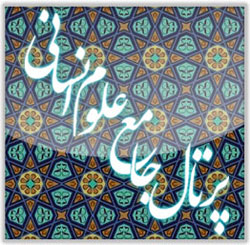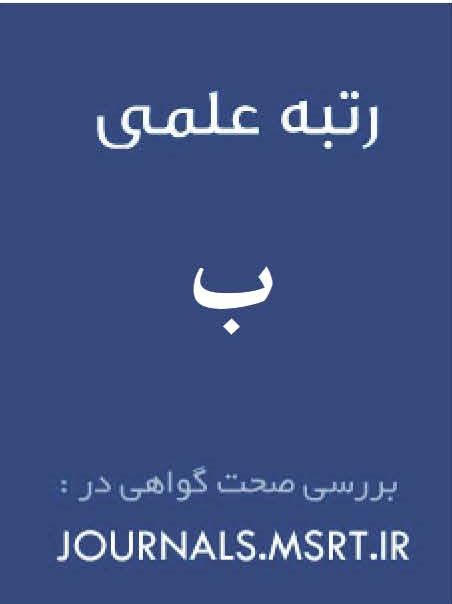The Theory of Differential Association in the Mirror of Saadi’s Gulistan
Keywords:
Differential coexistence, Golestan Saadi, Social relations, Crime prevention, Social environment, CriminologyAbstract
This study analyzes the social relationships and associations of characters in Saadi’s Gulistan through the lens of Edwin Sutherland’s theory of differential association. The differential association theory emphasizes that social behaviors—particularly deviant ones—are shaped through interactions and learning from companions. The aim of this research is to investigate the influence of social environments and human relationships on the behavior of characters and to present models for social crime prevention. Using content analysis methodology, this study examines the anecdotes in Gulistan from a criminological perspective, focusing on how social relationships affect the characters’ behaviors. The findings indicate that positive social environments and associations guide individuals toward ethical and socially constructive behaviors, whereas corrupt environments give rise to deviant conduct. These results underscore that Saadi’s teachings can be effective in crime prevention and in promoting positive social relations in contemporary society. The analysis of anecdotes reveals that Saadi, with particular sensitivity, highlights the decisive role of environment and companions in the formation of personality and behavior.
Downloads
References
1. Ingenito D. Beholding beauty: Saʿdi of Shiraz and the aesthetics of desire in medieval Persian poetry: Brill; 2020.
2. Naghizadeh M. Semantic Expansion of Taste Words in Saadi's Golestan within the Framework of Cognitive Semantics. Language Research. 2024;50:189-221.
3. Faghiri M, Modarresi F, Fatemian A. A Comparative Study of Tense and Mood in Saadi's Golestan and Majd Khafi's Rouzeh Khold with a Functional and Critical Stylistic Approach. Stylistics of Persian Poetry and Prose. 2024;98:159-76.
4. Moazani AM, Asadi R. Reflection of Practical Mysticism in Saadi's Works. Islamic Mysticism. 2024;79:1-23.
5. Lomas T. Towards a positive cross-cultural lexicography: Enriching our emotional landscape through 216 'untranslatable'words pertaining to well-being. The Journal of Positive Psychology. 2016;11(5):546-58.
6. Nilchian E. Sufi-Romantic Self Loss: The study of the influence of Persian Sufism on English romantic poetry 2011.
7. Bazayi L. Criminology in Educational Literature: Reflection of Criminological Teachings in Saadi, Hafiz, and Molavi's Works: Salehiyan; 2017. 1-103 p.
8. Viitamäki M. Poetry in Sufi Practice: Patrons, poets and performers in South Asian Sufism from thirteenth century to the present2015.
9. Abbasi M. Examining White-Collar Crimes from a Criminological Perspective (Using Sutherland's Theory). Ministry of Science, Research, and Technology - Payame Noor University. 2006;1:1-121.
10. Khosravi M, Khosravi M, editors. Reduction of Intragroup Social Capital in Iranian Families Under the Influence of Virtual Social Networks in Light of Sutherland's Differential Association Theory2014.
11. Ebrahimi Qavam S, Farahbakhsh K, Abdollahi R. Examining Sutherland's Differential Association Theory and Situational Criminology Theory in Explaining Violent Crimes of Male Prisoners in Isfahan Prison. Ministry of Science, Research, and Technology - Allameh Tabatabai University. 2012;1:1-110.
12. Afshar M, Mohseni F. A Criminological Reading of Saadi's Works in the Domain of Juvenile Deviance. Interdisciplinary Literary Research. 2019;1(2):1-27.
13. Kalamzadeh Eshratabad M, Hosseini J. Exploring the Reflection of Developmental and Critical Criminology Theories in Saadi's Golestan and Bustan. Legal Companion. 2019;12:527-600.
14. Akbarizadeh. Metalinguistic Analysis of Saadi's Golestan. Literary Criticism and Rhetoric Research Journal. 2018;7(1):1-20.
15. Rostami H, Molabigi H. Criminological Reading of Saadi's Works (Focusing on Golestan and Bustan). Legal Research Quarterly. 2017;20(77):229-63.
16. Vahdani Far O, Sarfi MR, Basiri MS. Analysis of Saadi's Golestan and Bustan Stories Based on Todorov's Theory. Persian Literature Text Studies. 2017;9(3):63-80.
17. Imani A. Criminology in Literature: Criminological Thoughts in Saadi and Molavi's Works: Arvij Publications; 2003. 245-320 p.
18. Mikkelson J. Beholding Beauty: Saʿdi of Shiraz and the Aesthetics of Desire in Medieval Persian Poetry. Domenico Ingenito (Leiden: Brill, 2020), 697 pp. Iranian Studies. 2022;55(2):575-7.
19. Sadr al-Hefazi SM. Educational Factors in Chapters Seven and Eight of Saadi's Golestan. Faculty of Literature and Humanities, University of Tehran. 2006;1:153-77.
20. Kämpfer C. Ingenito, Domenico: Beholding Beauty. Saʿdi of Shiraz and the Aesthetics of Desire in Medieval Persian Poetry. Leiden/Boston: Brill 2021 (= Brill Studies in Middle Eastern Literatures 41).€ 110, 00. ISBN 978-90-04-43589-6. 2024.
21. Lawrence J. Beholding beauty: Saʿdi of Shiraz and the aesthetics of desire in medieval Persian poetry: by Domenico Arturo Ingenito, Ser. Brill Studies in Middle Eastern Literatures, vol. 41, Leiden/Boston, Brill, 2020, 697 pp.,€ 110/$132 (hardback), ISBN: 978-90-04-43589-62021.
22. Dehghan A. Factors Influencing Productivity in Saadi's Golestan and Its Role in Management. Productivity Management. 2018;16:199-229.
23. Sahin A. Love of Learning as a Humanizing Pedagogic Vocation: Perspectives from Traditions of Higher Education in Islam. 2021. p. 137-87DO - 10.1007/978-3-030-82371-9_8.
24. Rajabi M, Hashemian L, editors. Examining Factors Influencing Personality Formation and Its Impact on Socialization in Saadi's Golestan2016.
25. Abdolmohammadi P. The Social and Political Thought of Sayyed ʿ Ali Moḥammad Širāzi, the Bāb. Eurasian Studies. 2024;21(1):102-26.
26. Zabihi R, Jahani MT, Hosseini G. Social Classes in Saadi's Bustan and Golestan. Ministry of Science, Research, and Technology - Ilam University - Faculty of Literature and Humanities. 2014;1:1-99.
27. Rahimi A, Rezaei A, editors. Golestan and Factors Influencing Education2016.
28. Ebrahimi J, Babaei L, Saghaei M, Nikdar Asl M, Bahmaniar M, editors. Literary Features, Educational, and Ethical Points in Selected Stories of Saadi's Golestan Character Analysis in Saadi's Golestan and Bustan Based on William Benham's Seven Planetary Types2021.
29. Esfandiar S. Contentment in Saadi's Expression / Saadi and Youth / Wisdom and Reason in Saadi's Perspective / A Word from Saadi About Arrogant and Proud People / The Impact of Companionship and Environment in Saadi's Expression. Tooba. 2007;17:101-6.
30. Shirkani S. Golestan of Education: (Educational Chapter of Saadi's Golestan, Special for Adolescents). Shalak. 2018;1:510-600.
31. Rahimi M, Mohtadiani K, Najarian M, Elhambakhsh SM. "Social Dilemma" and Its Application in Individual Teachings of Saadi's Golestan. Literature and Language. 2023;54:169-201.
32. Ahmadi OA. Sociological Content of Saadi's Golestan. Saadi Studies. 2009;14:12-23.
33. Ahmadvand M, Shamaei M, Moeini Fard B. Individual Teachings of Lifestyle: Lifestyle from Saadi's Perspective in Golestan. Social Sciences Education Growth. 2018;12:41-55.
34. Akbarpour Birjandi S, Dabaghiyan M, editors. The Impact of Poverty and Wealth on Crime and Victimization from Saadi's Perspective2021.
35. Kalamzadeh Eshratabad M. The Contrast Between Deterministic Thought and Crime Learning in Saadi's Criminological ApproachJO - Jurisprudence, Law, and Criminal Sciences. 2019;12:1-12.
Downloads
Published
Submitted
Revised
Accepted
Issue
Section
License
Copyright (c) 2025 معینالدین دریائی (نویسنده); محمدرضا رحمت; محمود صادق زاده (نویسنده)

This work is licensed under a Creative Commons Attribution-NonCommercial 4.0 International License.








